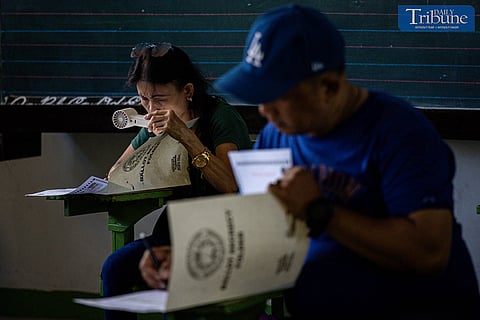
- NEWS
- the EDIT
- COMMENTARY
- BUSINESS
- LIFE
- SHOW
- ACTION
- GLOBAL GOALS
- SNAPS
- DYARYO TIRADA
- MORE

The May 2025 midterm elections reaffirmed a familiar truth in Philippine politics: Dynasties remain strong. However, in a year marked by renewed civic engagement, bold independent candidates and louder calls for reform, the cracks in the old guard are beginning to show.
Across the archipelago, dominant political families extended their control, often sweeping local races with little to no opposition.
But in key regions — from Marinduque and Misamis Oriental to Naga and Cebu — Filipino voters signaled a slow but significant shift toward greater political pluralism, hinting at a future where dynasties might not hold all the power.
In Misamis Oriental, former congresswoman Juliette Uy was proclaimed governor despite a legal protest by defeated incumbent Peter Unabia.
Uy’s camp has dismissed the protest but has pledged to investigate controversial deals during Unabia’s tenure, including public-private partnerships (PPPs) and hospital privatizations.
While Uy’s victory may seem dynastic in name, it represents a significant shift in political alignments and opens the door for much-needed reforms in the region.
Perhaps the most symbolic win of the 2025 elections came in Naga City where former Vice President Leni Robredo made history as the city’s first woman mayor.
Robredo’s victory, with an 84,000-vote landslide, was not just a political return — it was a powerful reminder of her late husband Jesse Robredo’s legacy of reform.
Robredo’s win, celebrated by civil society groups, reinforced the power of grassroots organizing and value-based leadership in an era increasingly dominated by political machines.
In Cebu, while dynastic forces largely held firm, there were signs of a political strain.
The Ouano siblings and the Chan couple kept their seats in Mandaue and Lapu-Lapu cities, respectively, but provincial Governor Gwendolyn Garcia faced a surprising challenge from political newcomer Pamela Baricuatro.
As partial results showed Baricuatro in the lead, it has sparked discussions about a potential political shift in Cebu — a province historically controlled by powerful families. This development is seen as a significant moment in Cebu’s political history, with the potential to break the stranglehold of dynasties.
Elsewhere, in Baguio City, voters chose a mix of experience and reform.
Mauricio “Janitor” Domogan, a former congressman who guided Baguio through a post-disaster recovery phase, was elected once again with 45,767 votes.
Incumbent Mayor Benjamin Magalong, who has earned praise for his handling of the city, was reelected with 55,497 votes. The city council saw a mix of returning and first-time candidates, signaling that while Baguio trusts experienced hands, it remains open to fresh faces in governance.
In Abra, a significant shift occurred when the Bersamin family dethroned the long-dominant Bernos clan.
Former governor Takit Bersamin and his niece, Anne Bersamin, triumphed in the gubernatorial and vice gubernatorial races, respectively, marking the end of the Bernos family’s decades-long grip on power.
Takit, known for his calm demeanor and approachability, had previously served as governor from 2007 to 2016, and his return to power signals a turning point in Abra’s politics.
The alliance between the Bersamins and JB Bernos, who was reelected as the province’s congressional representative, could reshape the political landscape in one of the country’s poorest provinces.
In Ilocos Norte, the Marcos family proved their political resilience, securing another sweeping victory.
Cecilia Marcos won the governorship in a landslide, with Matthew Marcos Manotoc returning as vice governor, and Sandro Marcos reclaiming the congressional seat previously held by his father, President Ferdinand “Bongbong” Marcos Jr.
A Marcos cousin, Angelo Barba, was also reelected, solidifying the family’s grip on the province. There were no surprises here, just a confirmation that in the north, the Marcos name remains untouchable.
Davao City also reaffirmed its loyalty to the Duterte family, despite the detention of former President Rodrigo Duterte in The Hague, the Netherlands.
Duterte’s mayoral run showed him leading with 659,557 votes. His children, Sebastian, Paolo, and grandson Omar Duterte have also secured the vice mayoral, congressional, and council positions, respectively.
While questions of political accountability may linger, the Duterte brand remains firmly entrenched in their Mindanao stronghold.
In Bataan, the Garcia clan strengthened its hold on power.
Governor Joet Garcia, Vice Governor Cris Garcia, and their congressional relatives Albert, Maria Angela and Antonio Roman III all won their respective races.
The younger generation, including Raquel Garcia and Grace David, also secured mayoral and vice mayoral victories, ensuring that dynastic control continues in Bataan.
In Pampanga, the Pinedas kept their grip on the province, with Lilia and son Delta winning key posts. But in San Fernando, incumbent Mayor Vilma Caluag broke the streak, defeating Mylyn Pineda-Cayabyab. In Angeles City, the Lazatin brothers remained dominant.
Zambales saw a near-sweep by Governor Hermogenes Ebdane Jr. and his Sulong Zambales Party, cementing their hold with 11 of 12 provincial wins and eight town halls.
Meanwhile, Zamboanga and Basilan delivered mixed results. Rep. Khymer Olaso led Zamboanga City’s mayoral race over incumbent-backed Mannix Dalipe, while Kat Chua and Kap Totong Perez pulled ahead in congressional contests. In Basilan, the Hatamans faced unusually close margins, signaling growing competition even within strongholds.
The bottom line? Dynasties still rule — but cracks are starting to show.
